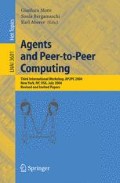Abstract
Several different forms of peer-to-peer interactions, associations and interpersonal relations between human and artificial intelligences are described. We build upon a new form of grid computing which integrates human and artificial ‘processes’ in electronically saturated physical spaces, called socio-cognitive grids. We start from the analysis of three scenarios in P2P applications: digital rights management, mass user support and customer-to-customer interaction. These enable us to identify those factors that motivate the computing components in the socio-cognitive grids to form social structures, individually incorporating socio-cognitive intelligence and social awareness. In order to study the emergent properties of these social structures, such as reciprocity, social exchange and social networking, we need a theory that will help us understand the dynamics of social integration and support. We explore the use of a classical sociological theory of social structures and interpersonal relations. Subsequently we outline the components of a software simulation built on this theory and designed to formalize and evaluate this socio-computational intelligence. Ultimately our main aim is to analyse and understand those emergent properties that lead to the formation of stable and scalable social structures in socio-cognitive grids.
Access this chapter
Tax calculation will be finalised at checkout
Purchases are for personal use only
Preview
Unable to display preview. Download preview PDF.
References
Yu, B., Singh, M.P.: Searching social networks. In: Proceedings of the Second International Joint Conference on Autonomous Agents and Multiagent Systems, pp. 65–72 (2003)
Berman, F., Fox, G., Hey, T.: Grid Computing: Making the Global Infrastructure a Reality. Wiley, Chichester (2003)
EuroGrid and Grid Interoperability, GRIP (2004), http://www.eurogrid.org
The Globus Alliance (2004), http://www.globus.org
Intelligent Information Interfaces (2004), http://www.i3net.org/
de Bruijn, O., Stathis, K.: Socio-cognitive grids: The net as a universal human resource. In: Proceedings of Tales of the Dissapearing Computing (2003)
Hey, T., Trefethen, A.: The UK e-Science core programme and the grid. Future Generation Computing Systems (FGCS) 18, 1017–1031 (2002)
Pitt, J., Mamdani, A., Charlton, P.: The open agent society and its enemies: a position statement and research programme. Telematics and Informatics 18, 67–87 (2001)
van der Pluijm, H.: Pay once, share often with LWDRM, Wired News (2004), http://www.wired.com/news/digiwood/0,1412,62739,00.html
Kurumatani, K.: Mass user support by social coordination among users. In: Kurumatani, K., Chen, S., Ohuchi, A. (eds.) Proceedings IJCAI 2003 Workshop on Multiagent for Mass User Support, pp. 58–59 (2003)
Wu, J., Stojmenovic, I.: Ad hoc networks. IEEE Computer 18, 29–31 (2004)
Cook, K.S., Whitmeyer, J.M.: Two approaches to social structure: Exchange theory and network analysis. Annual Review of Sociology 18, 109–127 (1992)
Blau, P.M.: Exchange and Power in Social Life. John Wiley and Sons, Chichester (1964)
Cook, K.S., Emerson, R.M., Gillmore, M.R.: The distribution of power in exchange networks: Theory and experimental results. The American Journal of Sociology 89, 275–305 (1983)
Homans, G.C.: Social Behaviour. Harcourt Brace, New York (1974)
Axelrod, R.: The Evolution of Cooperation. Basic Books, New York (1984)
Pitt, J.: Digital blush: towards shame and embarrassment in multi-agent information trading applications. Cognition, Technology and Work 6, 23–36 (2004)
Author information
Authors and Affiliations
Editor information
Editors and Affiliations
Rights and permissions
Copyright information
© 2005 Springer-Verlag Berlin Heidelberg
About this paper
Cite this paper
Ramirez-Cano, D., Pitt, J. (2005). Emergent Structures of Social Exchange in Socio-cognitive Grids. In: Moro, G., Bergamaschi, S., Aberer, K. (eds) Agents and Peer-to-Peer Computing. AP2PC 2004. Lecture Notes in Computer Science(), vol 3601. Springer, Berlin, Heidelberg. https://doi.org/10.1007/11574781_7
Download citation
DOI: https://doi.org/10.1007/11574781_7
Publisher Name: Springer, Berlin, Heidelberg
Print ISBN: 978-3-540-29755-0
Online ISBN: 978-3-540-31657-2
eBook Packages: Computer ScienceComputer Science (R0)

